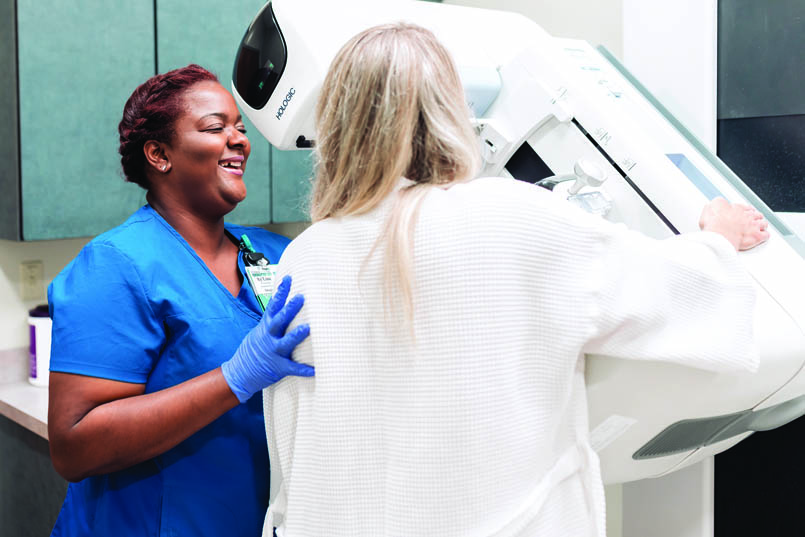29 Sep 2022 Conway Regional provides advice for Breast Cancer Awareness Month
By John Patton
Turning 40 can cause unpleasant feelings, particularly for women confronted with the dread of beginning yearly mammograms.
Dan Roubein, MD, a radiologist who has interpreted mammograms for 30 years, offers some reassuring advice. Roubein, a Conway resident, practices with Radiology Associates, P.A., at the Conway Regional Women’s Imaging Center.
“Having some apprehension about undergoing a mammogram is normal,” said Roubein. “We respect your concern and have professional, caring women who do everything they can to make the experience as tolerable as possible. The risk-benefit ratio is worth it because if we find cancer early, it is possible that it can be cured, and that is not something that can be said about every cancer.”

Roubein added, “We pay attention year to year to the amount of compression for each individual and strive for a happy medium between enough compression for an effective image and too much. It is uncomfortable, but a woman should not leave the mammography center with bruises. That is too much.”
Patients are only in a room with a dedicated female mammography technologist who averages more than 12 years of experience. The radiologists who interpret the mammogram are not present during the scan.
What is the age when every woman should have a mammogram?
“If a woman starts at 40, she will make a difference in her life. The research shows that around 40 is when breast cancer begins to have higher potential to be aggressive.”
What additional information should women know about mammography?
“The best way for us to detect breast cancer is through an annual mammography starting at the age of 40,” said Roubein. “Finding cancer as early as possible really changes the outcome. The sooner we can make a referral to an oncologist, the better it is for that individual patient. Women with later-stage cancer can do very well, but it is a different road.” The strict standard is necessary because breast cancer affects one in eight women regardless of their family history.
He added, “Incidences of breast cancer increase with age, but no one should ever be told that they are too young to have breast cancer.” For example, if a 30-year-old has concerns, she should speak with her doctor. “We do not want to dismiss anything, especially if they feel a lump. We tell you to do breast self-exams for a reason, so if you find something, we should take a look.”
Monthly breast self-examination is essential. “In the beginning, it is difficult to know what’s real, what’s normal tissue, what’s a new finding,” said Roubein. “Within a couple of months of doing the exams, they will become more familiar with how their breast tissue feels because it is different for every individual.” He advised that there are changes due to the menstrual cycle, so premenopausal women should perform self-exams two weeks before the regular cycle begins. Postmenopausal women should pick a day of the month and do the exam the same day monthly.
“Women who do those exams regularly will come in after finding things virtually the size of a grain of sand. It is usually not cancerous, but if it is, the patient is in stage 0 or 1 with a 95% cure rate.”
What is the No.1 risk factor for breast cancer?
“Being female. My personal experience has been that breast cancer is very rare in men, less than 1%. However, I do see a male patient every few weeks for breast issues, and we take those seriously because cancer can occur.”
Is there a particular type of mammography that is more effective than others?
“At Conway Regional, we have two state-of-the-art 3D mammography machines. 3D mammography allows us to see images in layers. We take that picture, and we can divide it into different slices. It has a lot of advantages:
It does increase the likelihood that we can diagnose cancer.
It decreases the likelihood that the patient will need additional mammograms. It can avoid some diagnostic mammograms. The 2D images are more likely to have you come back for another mammogram. A second diagnostic mammogram is recommended when the initial screening is inconclusive.”
Are there resources available for women who cannot afford mammograms or who do not have insurance?
The Arkansas Department of Health offers its BreastCare program that funds mammograms for eligible recipients. It is best to determine eligibility prior to arriving for a mammogram. To determine eligibility for BreastCare services, call 1.833.693.2942 or visit healthy.arkansas.gov/programs-services/topics/breastcare-program.









